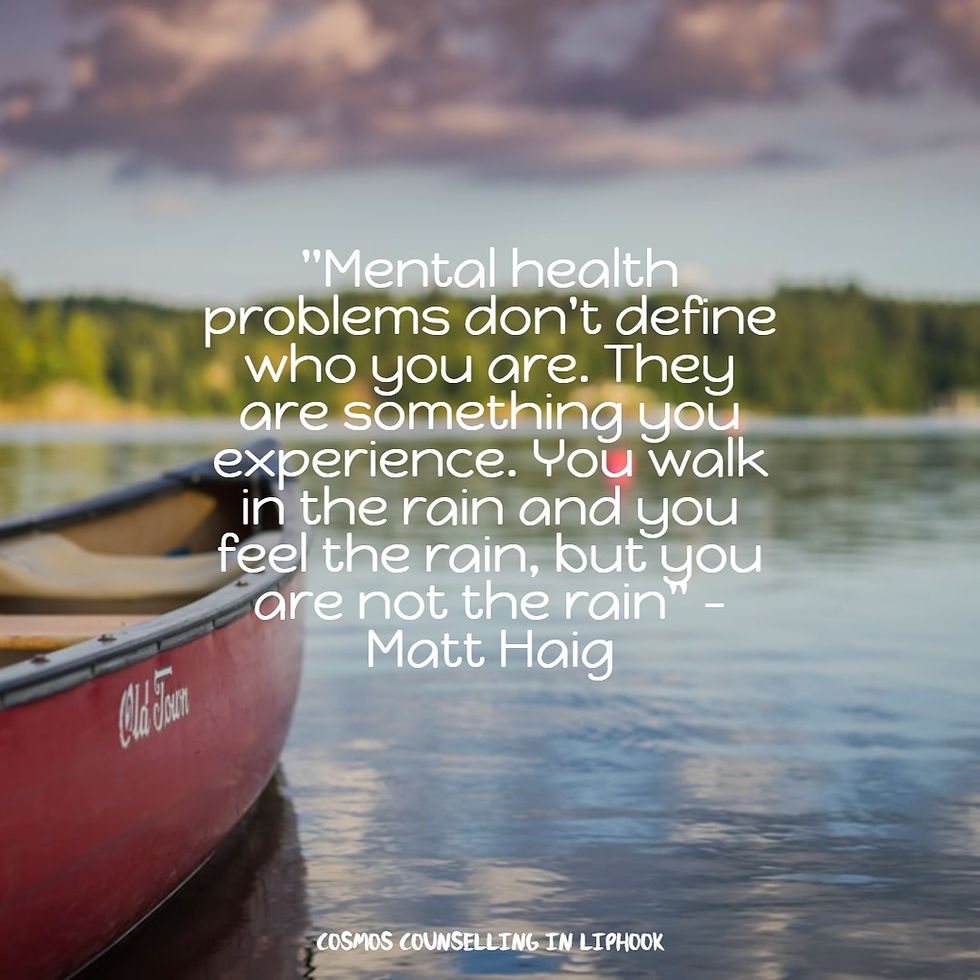The Discomfort Of A Storm
- Jul 26, 2025
- 3 min read
Updated: Aug 8, 2025

Mental health has become a hot topic in our society. Although awareness has increased, many still face stigma and confusion surrounding common mental health issues. It's important to realise that mental health struggles are merely experiences we navigate, not labels that define us. As author Matt Haig says, just like walking in the rain, we may feel the discomfort, but we are not the storm.
The Nature of Mental Health
Mental health involves our emotional, psychological, and social well-being. It impacts how we think, feel, and act. According to the World Health Organization, one in four people will experience a mental health issue at some point in their lives. Factors contributing to mental health problems can include genetics, environment, and life events.
Understanding mental health issues as experiences can be empowering. Just as a storm can pass, so can our mental challenges. For instance, 70% of individuals with depression report substantial improvement with therapy. Recognising this can encourage people to seek help without feeling trapped by their circumstances.
The Storm Metaphor
Think of walking in the rain or a storm. While the droplets can drench your clothes and cloud your vision, they do not change who you are. Similarly, mental health challenges can feel overwhelming, but they do not shape your identity. This metaphor reminds us that difficult emotions are temporary.
Embracing this viewpoint can inspire resilience and hope. For example, a person feeling anxious during a public speaking event may learn over time that those feelings are temporary and manageable. This realisation can lead to improvement and growth, encouraging individuals to seek out support and coping strategies.
The Importance of Seeking Help
Recognising that mental health problems are experiences, not identities, is a key step toward healing. Yet, it is helpful to understand when professional help may be beneficial. A report by Mental Health America found that 56% of adults with a mental health condition did not receive treatment in the past year.
Therapy offers valuable tools for managing mental health challenges. Therapists can help individuals explore feelings, identify triggers, and develop coping mechanisms. A case study in 2021 showed that individuals who engaged in cognitive-behavioural therapy reported a 50% reduction in symptoms within just eight weeks. Seeking help is a sign of strength and a crucial step toward recovery.
Building a Support System
Creating a robust support system is vital for maintaining mental health. Friends, family, and support groups can provide understanding and encouragement. Research shows that social support can reduce the risk of mental health issues by up to 50%.
When building your support network, opt for individuals who uplift you and offer empathy. These connections can be lifelines during tough times. For example, a friend who listens without judgment can help ease feelings of isolation. It is vital to connect with people who validate your experiences and encourage your journey.
Practicing Self-Compassion
Self-compassion is a powerful tool in facing mental health challenges. It means treating yourself kindly, especially during tough times. Research from Dr. Kristin Neff suggests that practicing self-compassion can lead to lower levels of anxiety and depression.
Engaging in self-care activities can also boost mental well-being. This might include exercise, journaling, or spending time outdoors. Aim for small, achievable goals to create a nurturing environment that supports your mental health journey. For instance, spending 20 minutes in nature can significantly lower stress levels.
Mindfulness and Grounding Techniques
Mindfulness practices can effectively help manage mental health experiences. Techniques like deep breathing, meditation, and grounding exercises can help you stay present and reduce anxiety.
For example, if you feel overwhelmed, take a moment to focus on your breath: inhale deeply for five counts, hold for two, and exhale for seven. Engaging in this simple practice can help regain focus and calm your mind, allowing you to weather life's storms more effectively.
Embracing the Journey
Navigating mental health challenges is a journey, not just a goal. Understand that healing takes time. While setbacks may occur, each small step forward demonstrates your resilience.
Celebrate every victory, whether it's taking a walk, reaching out to a friend, or attending therapy. These moments contribute to your overall well-being and serve as reminders of your strength. Remember, your identity is defined by your ability to face and overcome challenges, not by the struggles you endure.
Moving Forward Together
Mental health problems are experiences that many people face, but they do not define us. Like walking in the rain, we can navigate the storms of mental health without letting them become our identity. By seeking help, building a support system, practicing self-compassion, and embracing mindfulness, we can find our way through challenges.




























